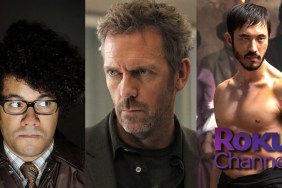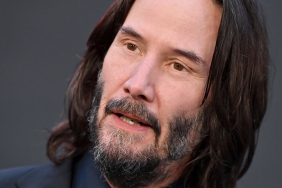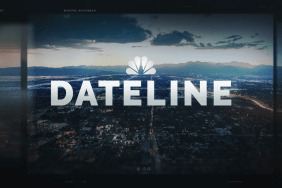Sporting a dark purple suit at the press day for Terminator Salvation, director McG was so eager to talk to press about his latest project that he came in excitedly asking the room full of reporters what we all thought of the movie. As he sat down, the engaging director noticed a journalist wearing a T-shirt with an old record on it and started the interview on his own by talking about how he missed record stores and how that tied into the film.
“Hi guys, I have a Technics turntable. This film has a lot to do with progress and there’s progress and de-progress, and I would consider the death of the record shop not progress. I’m not kidding. I love iTunes like the next guy, but I love sifting through the racks and finding records. I wanted the film, in fact, to feel very tactile, so we built everything and ultimately blew it up.”
Q: Can I ask you about that one shot that looks like one long tracking shot with Christian in the helicopter that was a really good scene.
McG: I’m very influenced by the Hitchcock picture “Rope,” where in that time they would run out of film in the mag and they’d move into somebody’s back full frame and that’s where they would hide their cut and do their thing. And one of the things that we wanted to do in this picture is honor the audience and the passionate by staging and blocking the picture in a way that wasn’t reliant upon cuts. I think cutting is a bit of a cheat, when say there’s a bunch of cameras on the scene, then we’ll cut it together and we’re going to make it work in post. We chose to go and scout the locations, Christian was a good sport, and we blocked the action very succinctly where you see him coming out of a hole, registering a dead Terry Crews, the camera swings around to see a transport ship of Skynet flying away, Christian runs over to a helicopter, and the pilot’s been killed, he gets in the helicopter to take off, all without a cut, the camera is now moving with him, the hole down below explodes, the helicopter crashes, [he] cuts himself out of the seatbelt, crawls out to see a mushroom cloud which is effectively the ashes of all the people he cares about, until he’s interrupted with the hand on the shoulder of a T-600. No cuts, and we do that a great many times in the picture in the spirit of saying, “We honor you audience, we’re trying to show a lot of leg work and a lot of planning went into this film, and it’s not just schlocky and cut together in the spirit of faking the action.” So that’s one example. The escape through the minefield, of the Marcus character and the Blair character, same thing, very, very long shots that they’re in the body of action sequences which one traditionally equates with a great many cuts, we chose to do in a single shot.
Q: The film is so rich and there’s so much going on, can you talk about any stuff that was shot that isn’t in the theatrical cut that we might see on the DVD?
McG: Yeah, but I have a very particular position about that, I always maintain that what is released is, indeed, the director’s cut. And shame on any director who doesn’t have the wherewithal to… right over here is a woman named Sue Kroll, she runs Warner Brothers, and she may like something or not like something, but it’s my job to articulate why it’s critical, that’s in the film. There’s an example of Moon was just in here, there was a topless scene with Moon that was designed to echo the Kelly McGillis/Harrison Ford scene in “Witness.” It was very innocent, they’re 30 meters away from each other, but at the end of the day we all looked at it and felt, oh that feels gratuitous and feels like we’re placating the genre, and it may give people a platform to stand on to take the film less seriously, and we don’t want that. So nobody pressured me to make that decision, I made that decision.
Q: Is that going to be on the DVD?
McG: I suspect it will be on the DVD, because Moon has a very sophisticated third wave feminist take on why she made that choice.

Q: Is that because you had a female producer?
McG: No, I’m a big fan of strong female characters, Jim Cameron is a fan, I think the strongest female characters in history have got to be Ripley in the “Alien” pictures and certainly Sarah Connor. So I come from a place of an empowered female position, and I think that the film tries to suggest a secondary gain of the bombs going off, because there’s no more ageism, there’s no more racism and there’s certainly no more sexism. Everything is ability based. You know how to fix a broken leg, go fix that broken leg. You know how to get the helicopter running, get it running. Nobody is hung up on the minutia and the ridiculousness of things that we’re hung up on today. Without ever shining a lantern on it you’ll notice that’s very, very prevalent in our picture.
Q: How did you go from being the “Charlie’s Angels” guy to getting this film and were you afraid that you might be stereotyped?
McG: No, I mean, it’s the privilege of the public to put people in boxes, you take the body of material that anybody has been a part of and you draw conclusions, and who would ever guess that a guy that was on “21 Jump Street” with a ridiculous name like Johnny Depp would go on to be one of the great entertainers of our time. You’ve got to earn your stripes and pay your dues, and I’m certainly willing to earn mine and fortunately I’m most comfortable in this genre ironically, these are the films that I grew up on. This was my film school, this was my passion, so I’m very comfortable working in this world and you just sort of take the good with the bad, you take your lumps along the way, and on this picture I tried to get away from being a cheerleader and really just let the film do the talking. It started at Comic-Con some year and a half ago, over a year ago, and we just said this is what the film is, and we let it speak for itself, and you try to honor the fan base by making elegant choices. Stan Winston, certainly Christian Bale, people have to take a closer look. And they weren’t excited about the prospect of the “Charlie’s Angels” guy making a “Terminator” movie, and respectfully, why would they be? What have I done that would suggest I’m the right guy? So you take a step back, you work that much more diligently, and you let the film do the talking.
Q: And what have you learned about yourself after making this?
McG: Well, I definitely hate myself, I can promise you that. But when you hate yourself I think it gives rise to a higher level of artistry.
Q: Why would you hate yourself?
McG: I’ve got a mirror, don’t I? I don’t know, it’s part of my own inner turmoil, and I don’t think we have enough time to get into that.
Q: How many drafts did you go through before finally settling on this?
McG: I read a draft that John and Michael wrote and that’s the reason why I’m here. I remember talking to Jim Cameron about it. “Why is this worth telling?” I said, “because it’s the future war and people are interested. I’m interested. It’s not a contemporary movie with the machine coming back in time and chasing someone. This is that world that you’ve only ever given us a tiny glimpse of and therefore that’s the point of entry.” He nodded and went, “oh that’s cool.” I’ll credit those guys for creating that world, but by the time I came onto the picture, those guys were busy doing their thing. We went through a couple of writers. Christian and I were working very intimately. Christian had an excellent shorthand with Jonathan Nolan. He did some production work while we were in New Mexico, and at the end of the day I think it’s the responsibility of me actually to be the arbiter of what goes in the film and what goes out. It’s always a team effort. There are a great many moving parts and that was the case in the writing of the script to say the least.
Q: Where do you want to see future “Terminators”? Where do you want to see this story go?
McG: Well, I wouldn’t be so bold as to say there’s going to be another one. I think it’s up to the people to see…
Q: I’m just saying what if?
McG: I’ve arced out a second film and a third film. I’ve spoken at length to [Jeff] Rubinoff about it. I’ve talked to Amy Pascal down at Sony about it. We’ll see what the appetite is. If the people jump up and say we want more, we’re certainly going to be ready. There are a great many places to go in a world where what was once science fiction is now upon us.

Q: Can you talk a little about casting Christian? He was in one of the biggest franchises, Batman, and you’re asking him to do another franchise. I wouldn’t have thought you’d have gone to him.
McG: That’s exactly why it was appealing because he’ll say to himself he’s bloody minded and he always likes a challenge and this was no gimme. Who calls himself McG? Who’s this guy talking to him? What are we out to do and why is this worthwhile? He likes a challenge like the next guy. I went over to England and I saw him. I wanted him to play Marcus. He was more interested in playing Connor and we went about the business of working on the script. You gotta understand, Christian Bale is so passionate about acting and about his craft. He has no entourage. He’s got no assistant standing out there in the hall. He drove here in a beat up pick-up truck. He is about the work. That’s who he is. And to work with an actor who’s that focused and that intense, I think, is to all of our benefit.
Q: Do you think your use of practical effects in this film is going to possibly move the industry toward more organic productions of action films?
McG: Well, I’m always using this example. I think the public has an intimate understanding of physics and I think filmmakers underestimate that. We all know what’s going to happen right there [demonstrates by dropping a pen on the table] and if I just said, we’ll do the CG pen, the audience would go, something was off about that dopey CG pen and it didn’t respond correctly when it made impact with the table. I also don’t like trying to get performances out of characters when I’m saying, “hey Christian, see that tennis ball? That’s a 7 foot robot trying to kill you and that green screen is ultimately going to be a post apocalyptic downtown Los Angeles.” That’s bullsh*t. I think that’s a cop out. You can’t reach your highest level of performance in the absence of a tactile environment. I think from a place of performance, from a place of feeling the heat, it’s in the interest of building everything, creating as much as you can in camera, and honoring the audience in that respect.
Q: There are a lot of explosions in this movie which are really great. Is there ever this pressure in terms of how do you build a bigger explosion that the last? Do you sit up at night thinking about it?
McG: I really don’t. This film was always designed to work at a table read like this where you just read it. What I wanted to do is tell the becoming story of Connor. Here’s a guy who’s been in the mountains, there’s been radiation all around and he finally comes out and he says hey everybody, I’ve got an idea how to win this thing. Well what does the guy who spent 20 years in the Marines who also survives say to this kid saying I know what to do? Shut the f*ck up! You do what I tell you to do. I’ve been surviving my whole life and I’m still here. So we see the becoming of the Connor character. That’s what the movie’s about. In regard to Marcus, I think it’s an allegory for what we’re experiencing today where if you have a bad heart, they’ll give you a new one. If you’re depressed, nobody says tell me about your mom and dad. They just say I’m going to manipulate your serotonin re-uptake inhibitors and you’re just going to feel better. We can clone a sheep and deconstruct the human genetic code and therefore, what is it that makes us human. Where does humanity lie? And the Marcus character is indeed a study of humanity and you may be able to put a few metal rods running through my body but at the end of the day I am a human being and I’m willing to go all the way to prove that. So it’s not about those explosions but I’m not apologizing for summer fare. I like that level of activity and at the end of the day it’s a “Terminator” movie and if we’re successful, it will work on both levels.
Q: Can you talk about casting Bryce and Moon? Both were very different in the film. What did each bring to her character?
McG: Bryce brought an elegance. She brings a First Lady elegance that I believe all the way. If you look at Carla Bruni in France, or you look at Hillary Clinton, or you look at Michelle Obama, these are very elegant people that I would personally believe in. I took one look at Bryce and I know a thing or two about her upbringing and who she is as a young lady and I thought that she’s effectively a wonderful first lady choice of this world. Then you take a look at Moon, and Moon to me is the third leg of that triangle of Ripley, Sarah Connor, Blair, because Moon can damn well do one-handed pull-ups on a psychiatric bed turned upside down and that’s following in the footsteps of Sarah Connor. She is a survivor and she doesn’t have a rich uncle in Hollywood. She’s got herself to pick up by her own boot straps and make it happen and I responded to that and I said I believe you would be the last woman standing so come be a part of this.

Q: Has Jim Cameron seen the movie?
McG: I don’t believe he has seen the movie. I look forward to showing it to him. He was the first guy I talked to when I was considering making the movie. I went down there out of a position of respect to kiss the ring and told him what my intention was. He says he reserves the right to like or not like the movie. I said, “I reserve the right to like or not like ‘Avatar,'” and we both giggled and went on our way but he told me that story and I’ve told it many times about his following the great Ridley Scott in the “Alien” picture and people said who’s this guy who made “Piranha 2” think he’s doing following Ridley Scott. He thought I can honor the mythology and tell the story. I think we’re all glad that “Aliens” got made. Hopefully we’ve done our job and created a new idea in a world that he most certainly created.
Q: Connor ends and goes through the film on such a note of intensity. Do you think it’s a challenge to craft an emotional arc for him in a sequel?
McG: I’ve reserved that for the sequel. This film is all about the burden of a destiny you don’t want. It’s not fun when somebody gets on the radio and says how many survivors are there? And I say one. Yet again one. Everybody died but me. I hate this curse of being the one who’s gotta always crawl out of there and carry the torch. That’s the burden of being the hero in this respect. In the next picture, we’re talking about exploring those more emotional arcs. So, we’ll see.
Q: Speaking of the big explosions and the summer movie, you had thrown down the gauntlet to Michael Bay for an explosion-measuring contest. I’m wondering if he has responded to that?
McG: It’s interesting because it’s the sort of thing that makes me never want to speak again because it was meant to be ironic. Somebody said whose robots are bigger? And I was thinking in my mind whose robots are bigger, that’s effectively like asking whose c*ck is bigger. So I responded well we can meet at the Spartacus steps at midnight and I thought it was painfully clear [raises his voice] I’M KIDDING! By the way, I’ve got a tiny Irish c*ck. I’ve got no business. I’m base packing a Dura-Flame. I know a guy who went to college with them. I can’t win that battle. So, it was meant to be ironic but the irony was lost in print so I’m done talking about such vulgar things.
Terminator Salvation hits theaters on Thursday, May 21st.









